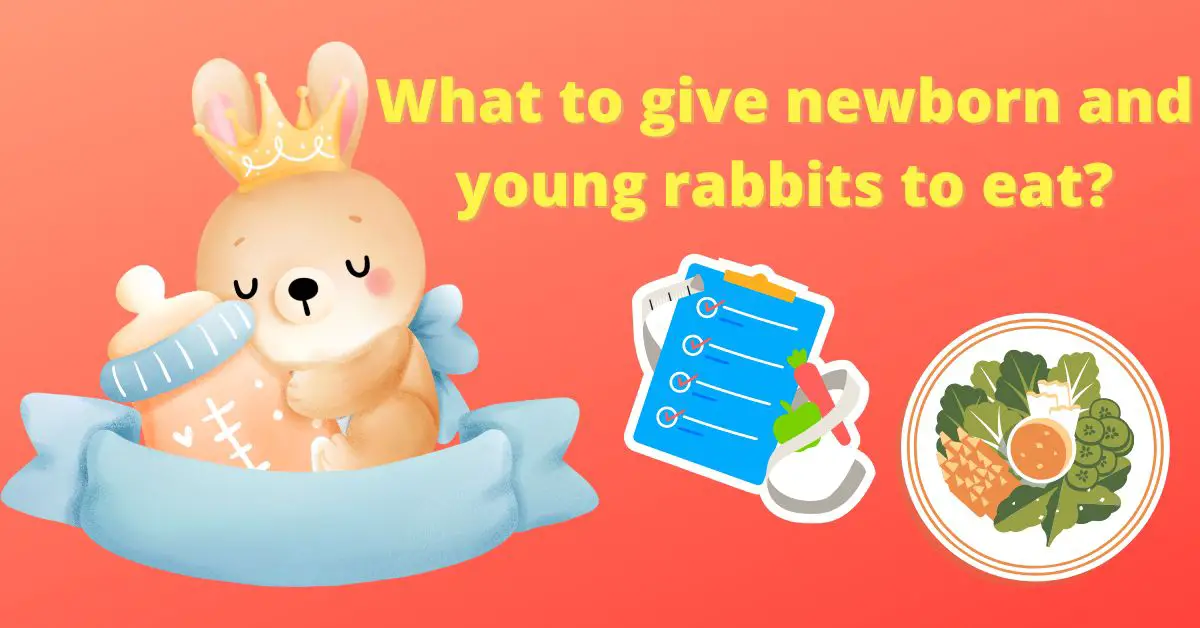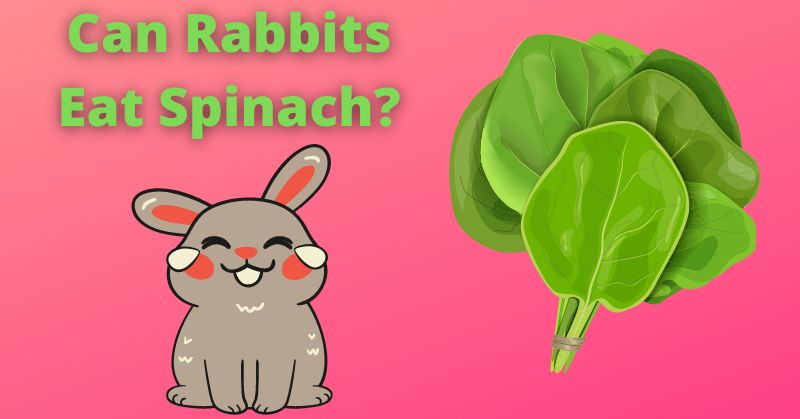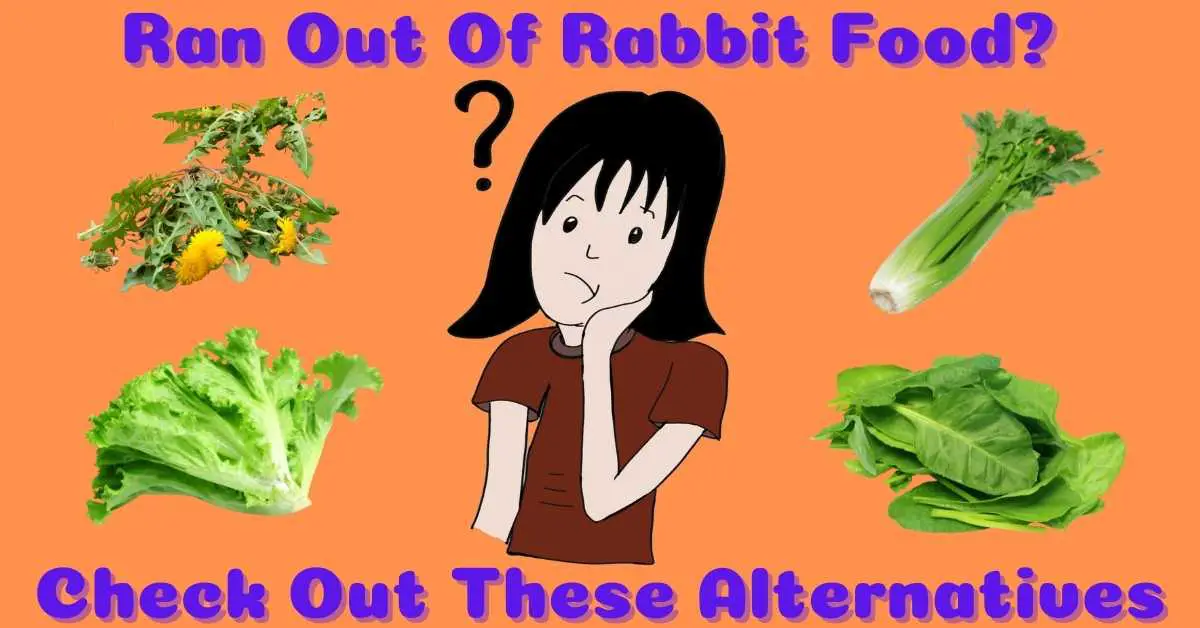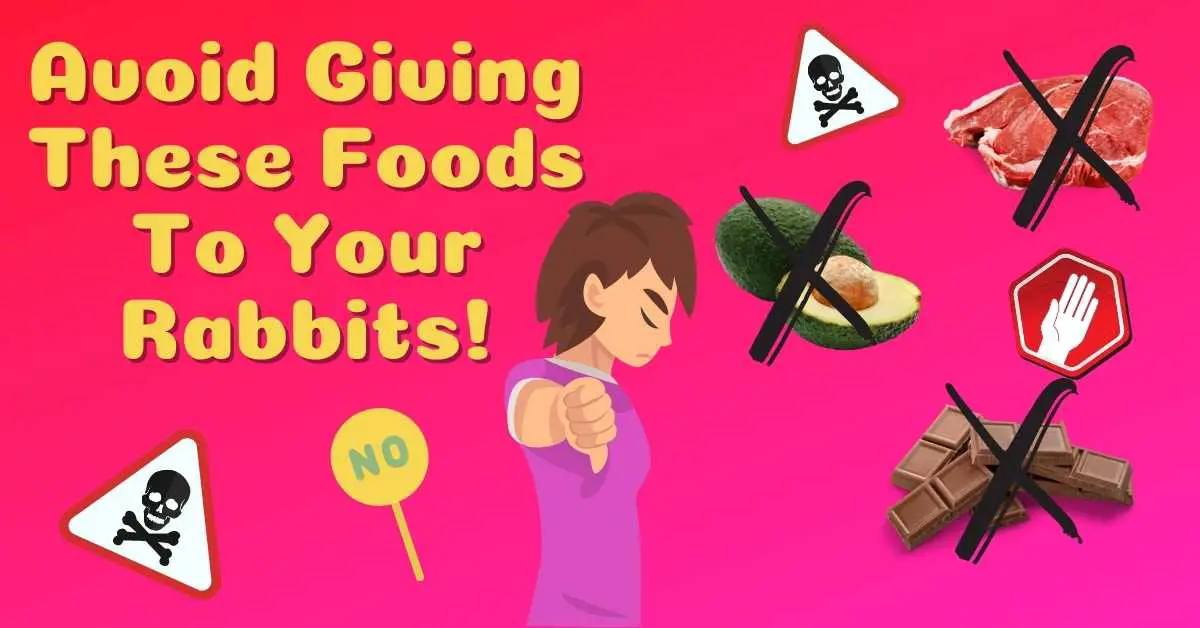Quick Answer: What to give newborn and young rabbits to eat?
To give young rabbits alfalfa pellets and alfalfa hay-free choice is a great idea. They need extra protein and calcium as they grow. They, too, can have a variety of vegetables.
I recommend that you speak to your veterinarian about the best food for young rabbits. Rabbits are very particular about what they eat, so I suggest that you try a few brands of pellets before making a commitment.
Long description of this topic below
Introduction: What to give newborn and young rabbits to eat?
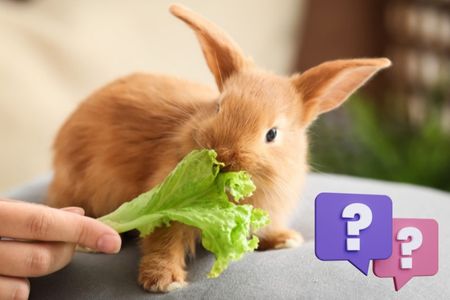
It is important to establish good eating habits in young rabbits. This can lead to obesity in later life if you overfeed them. When their growth spurts subside, your rabbit requires less protein and more fiber.
We will discuss what an optimal diet plan for babies rabbits is. You should also read our comprehensive guide on how to care for baby rabbits.
During the first six months of a rabbit’s life, development is crucial. During this stage, rabbits are constantly growing. Your rabbit’s diet should reflect this fact. By ensuring that your rabbit is sufficiently nourished, you will ensure that he or she has healthy bones and muscle mass into adulthood.
Rabbit pellets and alfalfa hay are crucial foods. Rabbit babies require more protein, so give them kitten or goat milk to mimic their mother’s milk. Weaning is required. If not, kitten or goat milk can be used to imitate their mother’s milk.
It is important to establish proper feeding habits with a newborn rabbit. It is common to overfeed young rabbits, but this can lead to obesity later in life. When their growth spurts end, your rabbit should be fed less protein and more fiber. We will give you the information you need about raising young rabbits. You may also want to read our comprehensive guide on caring for baby rabbits.
Rabbits are born blind and helpless, so their mother must provide nourishment and hydration immediately after birth. Mother rabbits produce a substance called colostrum, which is rich in nutrients and antibodies that help the baby rabbits’ immune systems develop properly.
Baby rabbits feed on their mother’s milk for the first three to four weeks after birth and then begin nibbling on grass and other plants. They continue to eat these foods until they are mature enough to survive on a diet of only plants.
When new owners discover what domestic rabbits eat, they are often surprised. Eating too much carrot or iceberg lettuce can cause health problems. Domestic rabbits sustain themselves chiefly on hay rather than on lettuce or carrots.
Because pet rabbits cannot live off the grass, hay is a decent substitute. By feeding hay throughout the day, you replicate the habit of wild rabbits, which graze on grass all day long.
Hay should be given sparingly, but fresh fruit and vegetables and specially formulated pellets are appreciated by rabbits. Rabbits enjoy fresh fruit and vegetables as well as hay.
Small pellets are critical for young and baby rabbits, supplying a range of vitamins and nutrients. Pellets are also calorific. As the rabbit ages, the quantity of pellets must be reduced. If your rabbit has stopped eating pellets, don’t fret.
It’s just as critical for rabbits to stay hydrated. A bottle or bowl that is connected to their hutch is the best way to provide water.
What should you give your pet rabbits to eat?
Pellets, hay, and fresh vegetables comprise the core components of a rabbit’s diet. Hay would be at the base of the pyramid, indicating its criticality.
A rabbit’s digestive system is specifically designed to digest grass fiber. Hay is available in several varieties, each with its own characteristics.
Pellets are thought to be an important part of a rabbit’s diet, but some believe that pellets are of no importance to adult rabbits and are just empty calories.
Hay should be given to adult rabbits if yours appears to be overweight. Young rabbits, however, require pellets to assist them to grow.
Fruit should always be saved as a reward, especially raisins, carrots, parsnips, and berries. Rabbits enjoy sweet flavors, but their bodies are not built to process carbs.
A rabbit should receive about a tablespoon of fresh fruit and vegetables for every 2 pounds of body weight.
An overweight rabbit should not be given fruit or vegetables for a while. A rabbit does not necessarily require these items to survive. They get all the vitamins they need from hay.
A Baby Rabbit’s Feeding Guide
Young rabbits must eat more frequently because they are growing continuously. Baby rabbits also require extra food to stay warm prior to their first molt. Here is some information on baby rabbit molting schedules.
Baby rabbits eat hay and pellets as they mature. They begin consuming solid hay at around 2 weeks of age. Their diet, however, will continue to change as they develop. By the time they reach 4 weeks old, baby rabbits eat hay and pellets.
Alfalfa hay can be given to baby rabbits to help them develop strong muscles and bones. Standard hay should also be provided. This will make the transition to adulthood easier.
It is crucial to ensure that you collect pellets that are specially formulated for young rabbits. These pellets will provide everything a growing rabbit needs.
Your rabbit’s diet should be consistent no matter what you feed him. Young bunnies are particularly susceptible to dietary changes. Unless it’s crucial, don’t change and chop.
What should a baby rabbit eat?
Before bringing your rabbit home, you should create a shopping list. Don’t guess when it comes to feeding your baby rabbit; healthy food is essential.
Buy alfalfa hay before you need it, but also get some traditional meadow hay. Your bunny cannot eat alfalfa hay forever, so don’t let them become too attached to the taste.
Your rabbit will also require pellets. Talk to the personnel at your local pet shop to discover the best type of pellets for your rabbit. There’ll be several alternatives, suited for different phases of life.
It is incorrect to believe that rabbits can eat as many pellets as they want. Pellets can spoil quite quickly if you buy too many. Smaller bags are preferred.
Can a baby rabbit eat pellets?
It is crucial to include pellets in your young rabbit’s diet plan. These will help your bunny grow up happy and healthy. Quality and quantity, on the other hand, should be carefully monitored.
It’s important to note that there are incorrect statements about rabbits being able to consume unlimited pellets. It is true in theory that the ever-growing body of a young rabbit will deal with the calories consumed.
Still, it is a bad habit to teach your bunny to expect a constant supply of pellets. It is better to establish an adult rabbit’s appetite for hay early.
Furthermore, choose the highest quality pellet possible. At least 22% of the material should be fiber. Protein should not exceed 14%. Stay away from items that contain more than 1% calcium, as this may be damaging.
A baby rabbit will pick out the nutrient-deficient fun ingredients, and ignore the rest if you are feeding muesli-based pellets. These pellets will be tastier, as they include nuts and seeds.
Feeding Hay
A rabbit’s diet should consist of alfalfa hay during the first year of life. Alfalfa hay provides the protein required to keep a rabbit healthy, as well as providing pellets to keep your rabbit healthy and strong.
It is important to give baby rabbits a mixture of alfalfa hay and traditional grass hay, rather than just alfalfa hay. Otherwise, the eventual transition to meadow hay will be less unpleasant.
Remember that your rabbit’s hutch will be filled with hay, and the rabbits will sleep on it and surround themselves with it. This also means that your rabbit will pee and poop in his hay.
Because baby rabbits have underdeveloped brains and bladders, they require a long time to become litter trained. This must be handled with care. Moldy hay, which is poisonous to rabbits, can result from urine. Clean their cage regularly.
It’s essential for your baby rabbit to see hay as a source of pleasure. Get them into the habit of grazing on hay as early as possible. Include it in playtime and exercise.
Fruit and Vegetables are fresh.
Historically, it has been thought that baby rabbits should not be given fresh food. This is because young rabbits have particularly delicate digestive systems. It is now known that fresh fruit and vegetables are good in small amounts.
There is a lack of education behind the belief that fresh vegetables are hazardous to baby rabbits. An upset stomach can result from feeding a rabbit any food that is inappropriate for its age. Dietary changes must be approached with care.
A baby rabbit should be brought home when the mother rabbit is still lactating. At four weeks of age, the bunny would have nibbled on these vegetables as well. Their stomachs can handle small doses of them.
A young rabbit needs fresh vegetables to help manage its teeth. Rabbit teeth never stop growing, and by eating tough, solid vegetables, they will be filed down.
It is best to avoid fruit in baby rabbits, except as a training reward. Provide small amounts of vegetables as a treat once your bunny has eaten enough hay.
Do baby rabbits drink water?
Young rabbits can consume water. It should be offered frequently.
Young rabbits begin to hydrate from their mother’s water supply at around 3 weeks old. As baby rabbits eat more dry food, water becomes especially critical. They must hydrate frequently to stay healthy.
It is critical to understand how your rabbit drinks. Some rabbits enjoy drinking from water bottles, while others prefer drinking from a bowl. Encourage your rabbit to drink in whatever way he or she prefers.
A shallow, heavy bowl is best for baby rabbits. If you provide water, be sure to keep it away from their hay, which will get wet and dirty if they splash around. Wet rabbits have a harder time maintaining their body temperature, which can lead to health problems.
Is it safe for baby rabbits to drink cow milk?
Rabbits should never be separated from their mother before the age of 8 weeks. Breakers who offer rabbits younger than 8 weeks should be avoided.
Rabbit milk is the closest alternative to kitten milk in case you must provide a rabbit with milk. Because cow milk is excessively rich in calcium, it should not be used. Warm goat milk is the closest equivalent.
Despite the fact that rabbit milk contains more calories than kitten milk, a tablespoon of sugar-free heavy cream should be mixed in. Twice daily milk feeding is necessary for baby rabbits.
A baby rabbit requires water and food after 2 weeks, in addition to milk. Failure to provide these will result in a malnourished rabbit.
Is My Rabbit’s Diet Balanced?
Young rabbits should take naps regularly, but they should be active in between. If your rabbit is lethargic, it may be because of a dietary deficiency.
It’s also possible to examine a rabbit’s well-being by looking at its excrement. Rabbit feces are an excellent way to gauge your rabbit’s intestinal health. Rabbits produce two kinds of feces:
A rabbit’s healthy poop pellets should be light brown and crumbly. Dark feces pellets indicate that the rabbit has consumed too much protein.
A bunny’s bowel problems are a medical emergency that can be fatal in as little as hours. Make an urgent veterinary appointment after following the first aid tips from the University of Miami.
My rabbit eats too fast
There’s nothing to be concerned about. Even if these lead to hiccups, they will be gone in a short time.
Baby bunnies eat quickly because of food insecurity. Before they establish a strict routine, bunnies worry about when they will be fed. They will eat as much as possible in case they are not fed again.
Because rabbits that share a hutch are particularly likely to eat fast, those who do so are especially concerned that an older bunny will eat their share otherwise.
Remember that baby rabbits always require nourishment. Once they establish a routine, they will become calmer.
My Rabbit baby is not eating.
Young rabbits refusing to eat is a serious matter. If your baby rabbit is not eating, finding out why is critical.
It’s not as worrying if a young rabbit eats less as he matures. As rabbits age, they require less nourishment. They may begin to eat more hay than pellets as a result. It is a good thing. Avoid feeding them too much alfalfa hay, however.
Your bunny may also be resisting a diet change. If they have a favorite food, they may be holding out for it. This must be handled carefully.
It’s crucial that you establish a healthy eating pattern early on, but if you cave too soon, you’re setting a dangerous precedent. They’ll refuse to eat anything other than what they prefer as adults.
A rabbit will refuse to eat if it feels a draft or if the food is located too close to its preferred toilet spot. The smell of rabbit urine is especially pungent. Move the bowl around if you want to keep your rabbit eating.
Make certain that your baby rabbit is not anxious. Separation from their mother and siblings can be distressing. Give your bunny plenty of TLC and a welcoming home environment to help him settle.
Young rabbits can undergo significant behavioral alterations if they are spayed or neutered. Your bunny may become anorexic for a short period of time. Keep an eye on them, and interfere if needed.

